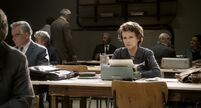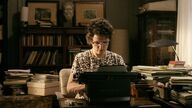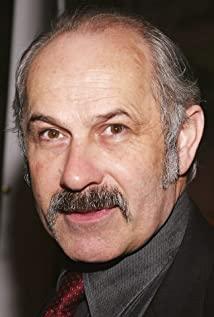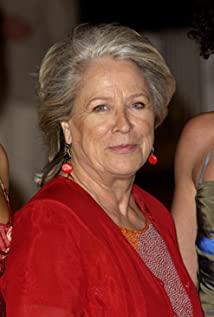As a biographical film, it focuses on shaping characters through events. In fact, I admire Hannah quite a bit after watching it. Before publishing the article in The New Yorker, her husband Heinrich asked her, are you sure you want to publish it? She said, "I'm sure - in the face of sensitive events that the entire human race has reached a consensus on, in the face of national and religious constraints, Hannah gives me a strong feeling of loneliness. There was one episode that really touched me: When asked by an old friend if she loved her people as a Jew, Hannah replied, you know, I don't love anyone, why should I love him? I only love my friends. I am deeply shocked here, why can I say so clearly that I don't love my own nation? An article in The New Yorker became a turning point in the plot. After the article was published, Hannah's family no longer had friends coming to parties, formerly friendly neighbors sent insulting letters, and because of writing "The Origins of Totalitarian Politics" The social prestige brought by it was subverted overnight, and friends who had been friends for many years no longer saw each other... Under pressure, Hannah moved to the woods and continued her own thinking. The vast majority of people are scolding her - why do you defend Eichmann, why do you attribute the blame for the massacre to her own people? Are you not a Jew? Calling her callous and even more implicated her teacher, Heidegger, as if they were both born Nazis. I have also struggled with this question, is it necessary to love one's own country and race? I think, whether it is things or feelings, love is because it is worth loving, and Hannah, what she loves is thinking. As a philosopher, Hannah undertakes the teaching job at the university. Of course, after the article was published, the school also suggested that she did not want her to continue teaching, but Hannah refused. Hannah insisted on expressing her true views to students, just as she insisted on publishing articles, and obviously the effect of the two was vastly different. Hannah did not deny her Jewish identity, but neither did she show a strong hostility to the Nazis. She insists on observing, thinking, expressing and clarifying the origin of evil in this world in a philosophical way. The film recalls her past with Heidegger in three clips of Hannah's thinking. Heidegger taught Hannah how to think and made Hannah feel the power of thought. As far as Heidegger is concerned, apart from his philosophical achievements, it is controversial that he served Hitler's government as a member of the Nazi party. Hannah also asked him why he did not explain it to the public. Years later, Hannah kept silent and returned to the mountains when she was controversial. Many scenes in the film are Hannah smoking alone in the dim light, as Heidegger said, thinking is lonely. Philosophy is also a meal for the lonely. After the New Yorker article was published, Hannah was Submerged in public opinion, at this time, Hannah gave me another strong feeling, arrogance. For example, citing Greek words that the general public does not understand. It gave me a strong feeling that whether you understand or not is your business, and I will not change my expression. Therefore, she rejected the editor of The New Yorker's proposal to delete the article in order to avoid public opinion pressure due to conflicts with social consciousness. 's suggestion. The above is framed by fragmentary plots, and the Jerusalem trial and the university speech are the highlight of the film, which is the turning point and sublimation of the film. The reason why I have been emphasizing the "plot in the film" is that as a film, it is a condensed product. For philosophers and philosophical thoughts, it is impossible to describe their life course in a single word. Part of it is also because I have no in-depth understanding of Hannah Arendt's philosophy, so all expressions are only in terms of the film itself. Friends celebrated for her to witness a "historic moment" before heading to Jerusalem, which her husband, Heinrich, sees as a trial of history, not an individual. When the trial began, after meeting Eichmann, Hannah's concept was turned upside down a little bit, and she told a friend that he was not what I thought. The Nazi that she thought brought disaster to the Jewish nation was not as extreme and crazy as Hitler, but was locked in a cage like an animal, wiping his nose constantly because of a cold, he was just a member of the Nazi government Ordinary bureaucrats, speaking of the clichés that the Nazis blamed themselves. Hannah believes that the entire Nazi act against humanity should not be attributed to such a single person. In other words, he is just a "being", his existence is not sin, his sin is his "ignorance". How many terrible things can a man without a mind do when he gives his mind and ability to think to others? That's what's really scary. There is a scene in the film where the judge asks Eichmann if his commitment to the Nazi Party ended with Hitler's death? Eichmann's answer is yes. When the sentence was finally pronounced to hang Eichmann, her husband Heinrich said that he should be allowed to live, which is the best punishment for him. Personally, I believe that Eichmann's consciousness was obedience to the Führer and the "law" during the Nazi period. This consciousness ended with Hitler's death. At that time, Eichmann truly became an "ignorant", in other words In other words, the walking dead. It is said that the power of consciousness is great, in this view, the power of the ignorant is even more terrifying. At the end of the film, Hannah insists on completing a class, or rather a speech, despite controversial circumstances. She still uses a philosophical way to think, analyze and reason Understanding things, not being influenced by public opinion and trends, has become her characteristic, and because of this, she is Hannah Arendt, and calm, sometimes, can be seen as cold, especially in When the crowd is angry, just like the second half of the film, keeping calm at this time requires perseverance. For Hannah, it has become a habit of her, between her original impression and the reality she sees. , Hannah was struggling, for sin, she struggled all her life. I personally appreciate people who can analyze rationally and keep calm, so at the beginning I said that I like Hannah very much, because she is sober enough, but the reality she encounters is always chaotic, and it is very painful to stay sober, But people should still be sober and calm, at least that's what I demand of myself. We have correct judgments about things and ourselves. We are not "ignorant" people. We do things within the scope of our own rationality. Because of "knowledge", we are individuals, not just "existence". It is very necessary to study philosophy and form a philosophical vision. It is not because of such a function that we study philosophy, but that philosophy can indeed make people learn to think and truly feel the power of thinking.
View more about Hannah Arendt reviews









